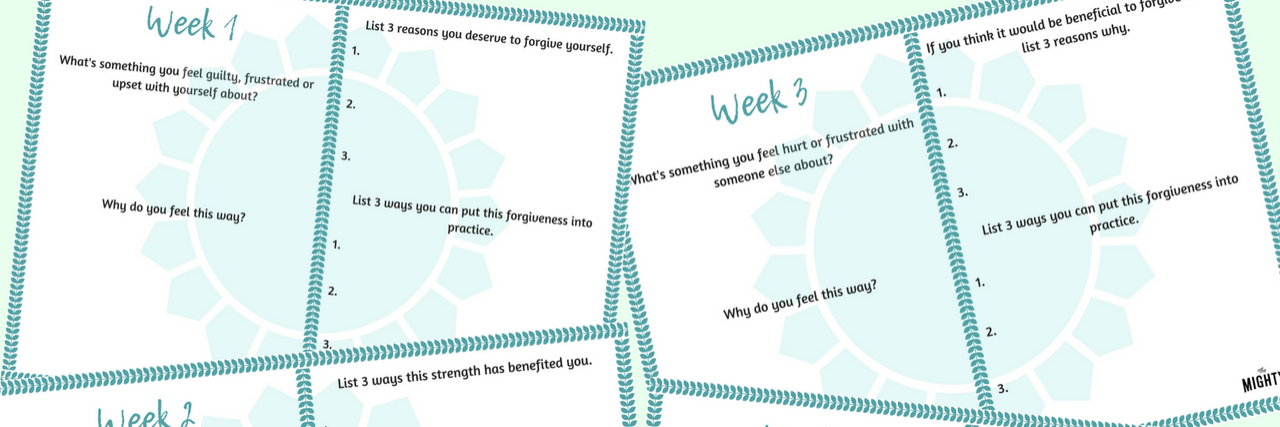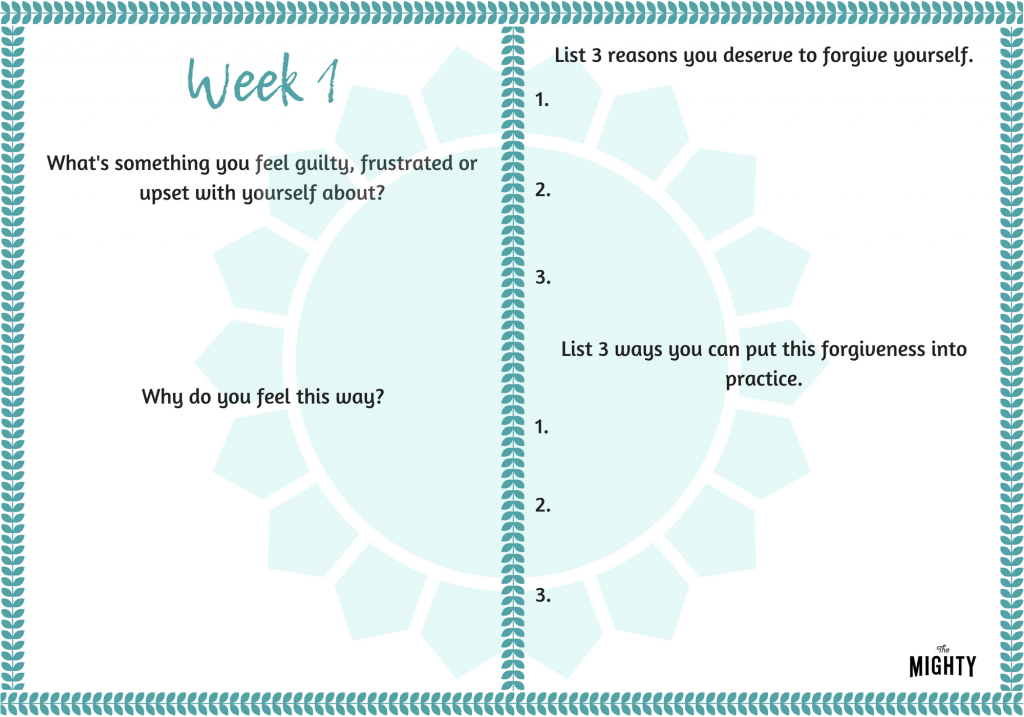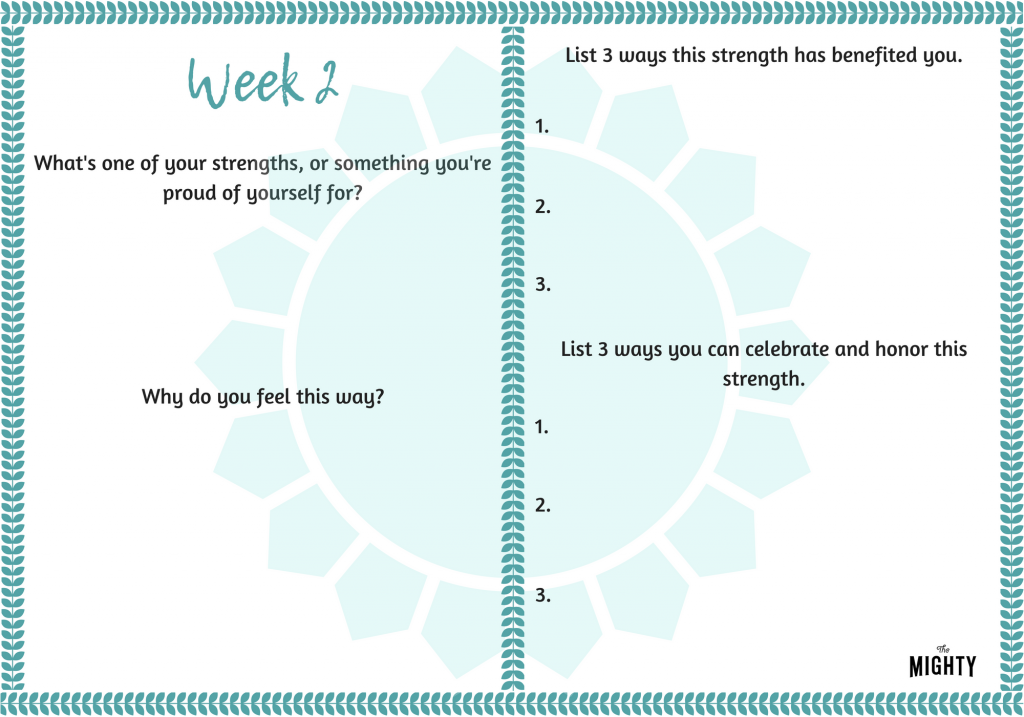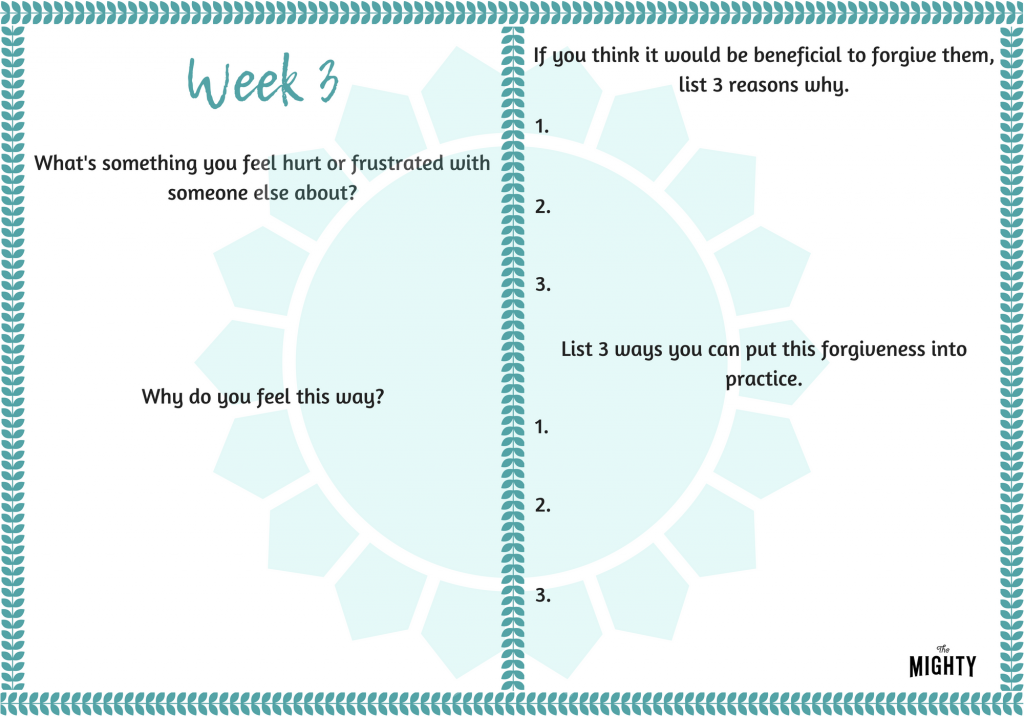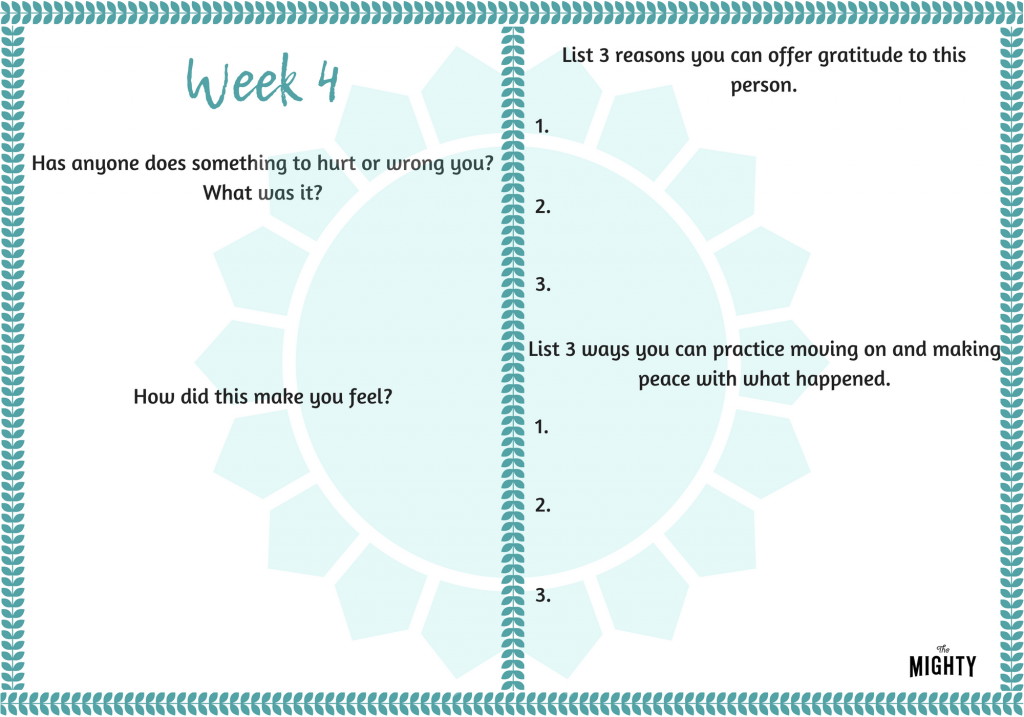Living with an illness or disability, or caring for someone who does, isn’t easy by any means. Things don’t always go as planned. Sometimes you don’t make the “right” choices – the ones that are best for you and your health. Loved ones, well-intentioned as they may be, say things that are hurtful, and friends may leave.
These experiences happen to everyone, but they tend to be especially relatable for those who live with chronic conditions — be it a physical illness, mental illness or both. When things don’t go as you intended because of your health, it can be so easy to build up frustration, guilt, loathing, whether it’s directed at others or at yourself.
That’s why our My Mighty Month challenge for June is practicing forgiveness.
When I think of forgiveness, I think back on the silly arguments my sister and I would have as kids, which usually ended with one of us mumbling, arms crossed, “I’m sorry,” and the other rolling our eyes and sighing, “I guess I forgive you.” Those words didn’t mean much back then. “I forgive you” just seemed like the thing you were supposed to say after someone apologized for doing something wrong, or doing something that hurt you.
Of course, forgiveness isn’t just something you offer to conclude an argument, nor is it an admission that any wrongdoings are “OK” or “acceptable.” Merriam-Webster defines the verb “forgive” as “to pardon” or “to cease to feel resentment against.” Forgiveness is not saying “it’s OK” that something upsetting happened. Forgiveness is recognizing that yes, what happened was hurtful or frustrating, then processing those feelings and trying not to let them hold power over you going forward.
Still, forgiveness is a tricky thing, and it can look different depending on your situation — whether you’re forgiving yourself, someone else or perhaps you’ve decided it’s in your best interest not to forgive someone at all (that’s OK too!).
Over the course of June, we’re going to focus on a different aspect of forgiveness every week so we can really slow down and explore what it looks like to forgive ourselves and others. Below, you’ll find an outline along with notecards you can print or download and fill out. Feel free to follow along week by week or skip around and go at your own pace!
Week 1: Forgiving Yourself
Download the Week 1 notecard here.
I have a lot of health issues, physical and mental, that I struggle with in some shape or form every single day. I’ve been dealing with the same ol’ symptoms for as long as I can remember. At this point, they’re just part of my life and sometimes I forget that having excruciating pain or debilitating depression isn’t “normal” or something I just have to “suck up” and “push through.” I’m hard on myself. And when everything health-wise becomes too much and I have to cancel plans, stay home from work, or ask for help around the house, I berate myself endlessly. Wow, way to go. This is all your fault – you probably did something to cause it. You’re pathetic and weak. Everyone hates you. The negative self-talk fires around and around in my head, so often I’m barely even conscious of it happening. Guilt, frustration and self-loathing slowly set in over time. Still, I never give myself a break.
Does this sound familiar? It’s unfortunately so common amongst those of us living with health conditions to mentally beat ourselves up over the way our bodies behave, even if we don’t always have control over it.
According to clinical psychologists Shoba Sreenivasan, Ph.D. and Linda E. Weinberger, Ph.D., “Unforgiveness leads to festering of negative emotions and suppressing one’s psychological and spiritual growth.” That’s why it’s important to forgive ourselves when we make mistakes or let ourselves down. Whether it’s truly our fault or not, none of us are perfect, and we will make mistakes.
So how do we go about forgiving ourselves? Dr. Sreenivasan and Dr. Weinberger write:
When it comes to self-forgiveness, it is not enough to say you forgive yourself. Genuine self-forgiveness is a process. It often involves making amends in whatever way possible (through acts that undo harm, or through practicing kindness to others, or through engaging in forgiveness when others transgress against you). It involves a move away from obsessive rumination and self-incrimination about the situation that promoted the transgression. It means cultivating empathy for oneself.
Practicing forgiveness with yourself and letting go of any guilt, shame or anger is a process, and not one we expect you to be able to perfect this week, or even this month. Rather, take this week to start thinking about ways you can be patient, gentle and loving with yourself. For example, are you hard on yourself because your illness prevents you from being able to keep up with the laundry? Be kind with yourself this week. So maybe you can’t wash your clothes, but you’re battling an illness, maybe several! Focus on what you can do, and give yourself some grace.
Week 2: Celebrating Your Strengths
Download the Week 2 notecard here.
Forgiving yourself is hard work. It can be mentally and emotionally taxing to spend a week thinking about the ways you’re tough on yourself or reasons you may harbor guilt, frustration or self-loathing (even if the end goal is to cultivate self-love). That’s why we’re challenging you this week to celebrate your strengths. What are your talents? What are you proud of yourself for? Whether it’s raising some amazing kids, creating art, keeping up with schoolwork, spreading kindness, raising awareness for your disease or keeping up with all your illnesses, medications and appointments, we know you’re a rockstar in some shape or form.
This week, focus on your favorite aspects of yourself. Remind yourself why you’re so incredible, and work on cultivating self-compassion. “Self-compassion and self-forgiveness go hand-in-hand,” says licensed psychologist Margaret Wehrenberg, Psy.D. The more you can work on loving and having empathy for yourself, the more capable you will be of forgiving yourself.
Week 3: Forgiving Others
Download the Week 3 notecard here.
Arguing, getting hurt, feeling betrayed… it happens to all of us. When someone does something wrong or treats you poorly, it can be stressful and upsetting both physically and emotionally. When you live with an illness or disability, you know that any amount of stress or emotional turmoil can easily exacerbate symptoms or set off a flare.
Forgiveness is not simply accepting the person’s actions as “OK” and moving on or minimizing any pain they caused you and saying it no longer affects you in any way. It’s OK if you can’t wave a wand and magically make the hurt go away. Psychotherapist Nancy Colier LCSW, Rev. suggests that forgiveness does not mean forgetting about the hurt inflicted, but letting it stay in the past:
Forgiveness suggests an openness to meeting the present moment freshly. That is, to be with the other person without our feelings about the past in the way of what’s happening now. Forgiveness involves being willing and able to respond to what’s happening in the present moment and not react through the lens of anger and resentment, the residue from the past. In meeting now, freshly, we stop employing the present moment to correct, vindicate, validate, or punish the past. We show up, perhaps forever changed as a result of the past, but nonetheless with eyes, ears, and a heart that are available to right now, and what’s possible right now.
Of course, this is easier said than done. But many studies suggest forgiving others is good for your physical and mental health. Forgiveness has been linked to improved cardiovascular health and reduced levels of stress. If you are holding onto a lot of anger or resentment towards someone, try thinking about whether forgiving them could benefit you and your health this week.
Wondering how to begin putting that forgiveness into practice? Below are several articles with suggestions from licensed therapists and doctors.
- How Do You Forgive Even When It Feels Impossible? (Part 1)
- How Do You Forgive Even When It Feels Impossible? (Part 2)
- 7 Rules of Forgiveness
- Forgiveness After Betrayal
- 10 Simple Tools to Help You Find Forgiveness
Week 4: Offering Gratitude
Download the Week 4 notecard here.
There are some things in life that may feel “unforgivable” – and that’s OK. People do some really terrible things, and maybe, after some reflection, you’ve decided that forgiving them just doesn’t feel right or wouldn’t be best for your health.
Forgiveness isn’t always the healthy choice, says psychoanalyst Jeanne Safer, Ph.D. “Not forgiving needs to be reconceived,” she writes. “It is not an avoidance of forgiveness or a retreat into paranoia, but a legitimate action in itself, with its own progression, motivation and justification. There are many circumstances in which it is the proper and most emotionally authentic course of action.”
Safer goes on to describe three “types” of healthy unforgivers:
1. Moral unforgivers – For them, refusing means telling the truth, asserting fundamental rights and opposing injustice.
2. Psychologically detached unforgivers – They accept the painful reality that they cannot experience the positive internal connection with a betrayer (usually a parent) which forgiving would require.
3. Reformed forgivers – They have faced conflicts between feelings, religious principles, ethics or social responsibilities, and reject the conventional attitudes they once accepted.
If you feel you fall under the umbrella of a healthy unforgiver, that is perfectly OK. Instead of challenging you to practice forgiveness toward them, we’re challenging you this final week to practice gratitude.
If someone has deeply hurt or wronged you, you may be wondering why in the world we’re asking you to thank them. During week two, you know how we asked you to celebrate your strengths to cultivate empathy and self-compassion, to hopefully help you in your journey of forgiving yourself? This is similar. We’re not asking you to love or forgive this person, but take a few moments to focus on any positives. Did the experience teach you anything? Did it help you grow or develop any skills?
This is a tough challenge, but if you’re up for it, you could also try a gratitude visit. Gratitude visits are a social exercise where you write a letter to someone you are grateful for but haven’t expressed that gratitude to. The key to this exercise is writing a one- to two-page letter expressing your gratitude in detail, outlining specific situations and the effect that person has had on you — really detailing your gratitude to them. If the person is still in your life, you can read it to them and have a conversation about it – but of course, your safety and well-being are the top priority, so this may not be an option.
Even if you don’t end up forgiving someone (or even yourself), we hope you can start identifying any unnecessary negative emotions you’re holding on to and work on resolving them in whatever way is best for you and your health.
Want to make June a Mighty Month? Join us on Facebook at My Mighty Month, and don’t forget to tag any social media posts with #MyMightyMonth. You can also sign up for our My Mighty Month emails, (select “Mighty Monthly Challenges” from the newsletter options), which include tips and reminders designed to keep you motivated.

